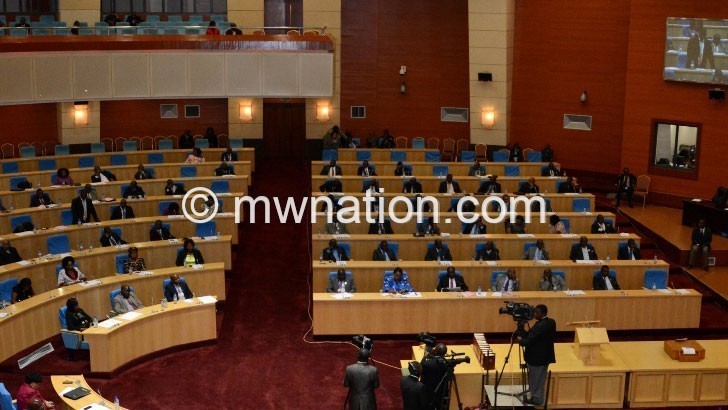Setback for federalism
Parliament’s failure to undertake a comparative study is stifling the thrust to champion debate on changing the current unitary system of government to federalism, parliamentary officials have said.
The Parliamentary Committee on Legal Affairs which was mandated to carry out the task has since complained that it has not been funded to carry out the study.
This development, according to the committee’s former chairperson Kezzie Msukwa does not offer optimism to proceed discussions on federalism.
In an interview this week, he said the committee was tasked to conduct a comparative study in some countries where the federal system of government is practised.

He said his committee had carried out desk studies on the matter but it was imperative to expose its members to comparative studies by visiting some countries.
“The idea was to get first-hand information by observing and talking to people, including politicians and academicians, to establish what was best for Malawi. So that has not been done but I hope the current committee will pick it up,” explained Msukwa.
Stumbling blocks
The current chairperson of the committee Yusuf Nthenda indicated his committee is yet to start looking into the issue.
He said: “It’s unfortunate that since the issue was referred to our committee, we have not discussed anything. So if we are to do anything perhaps it will be in the coming sessions.
“One challenge we have had is insufficient funding to Parliament as per requirement. Unless we find a sponsor to finance us, it will be difficult to work on the issue.
“We were supposed to first meet as a committee and debate on countries where federalism is practiced. Thereafter, determine which countries to visit and conduct the study from but in the absence of adequate funding, we are handicapped and cannot do anything,” Nthenda said.
University of Malawi’s Chancellor College political scientist Ernest Thindwa said there was no better arrangement than federalism in terms of bringing government closer to its people.
Said Thindwa:“The closer to the people government is, the more responsive, in principle, it becomes unlike the unitary system we are in now. However, I would not support the idea of going federalism flat out now because we have more to learn first.
“Government institutions and citizens themselves need to prepare for federalism. I don’t think we have appropriate institutions to facilitate federalism now. We will need to create them through constitutional amendments so while I support the change we are not ready yet as a country.
“What we need to do first is implement decentralisation in its totality because it is part of devolution that will give us an opportunity to learn because as it is today, it’s not fully implemented before going to federalism.
Chihana vs Tonse Alliance
Before ascending to power in June last year, President Lazarus Chakwera as leader of opposition then, urged the country to adopt a federal system of government arguing the then Peter Mutharika administration was misplacing priorities.
However, some advocates of federalism felt the campaign would fall off after Mzimba North lawmaker Yeremiya Chihana accused some ministers in the Tonse administration of corrupt practices. The sole Alliance for Democracy member in the 193-member House, was highly regarded as the face of federalism when he tabled the highly contentious motion in Parliament in September 2019 proposing a constitutional change for Malawi to abandon the unitary system of government and adopt federalism.
Chihana further suggested that government should just conduct a national referendum to allow Malawians to decide on whether to adopt the federal form of government or maintain the unitary system.
However, after a heated debate the bill was referred to the Legal Affairs Committee for further scrutiny.
This followed another attempt in June 2018 when member for Rumphi East Kamlepo Kalua, then under People’s Party, tabled a similar motion which was defeated after intense debate.
While most parliamentarians from the Northern and Central regions, then constituting the opposition bloc, supported the bill, those from the Southern Region, regarded as the bedrock of the governing Democratic Progressive Party (DPP) then, opposed it.
Both Kalua and Chihana argued the motions were in the interest of Malawians as the federal system of government would ensure equitable distribution of resources and development in the country as well as equal participation in political decisions.
In his inaugural State of the Nation Address, Chakwera challenged the Mzimba North legislator to provide evidence for his allegation which he did not and eventually withdrew his claim through the office of the Speaker of Parliament.
Several advocates of federalism are now worried that the Tonse Alliance may not support the campaign.
On his part, executive director of Church and Society of the Livingstonia Synod Moses Mkandawire said he expected Chihana’s issue would not derail the goodwill already displayed by the President.
He said he would expect sanity to prevail while the people sustain their thinking and look at federalism issue as a substantive matter “as it has always been because it is about our nation and not personal innuendos or interests.”
A few years ago, a movement comprising religious leaders, civil society organisations, and academics from the North established the Forum for the Advancement of Federal System and Rural Development, to champion the cause through demonstrations, petitions, public statements, among others.
In Africa, Nigeria, Ethiopia, South Africa and South Sudan are among the countries currently practicing federalism or closer to federalism.






One Comment